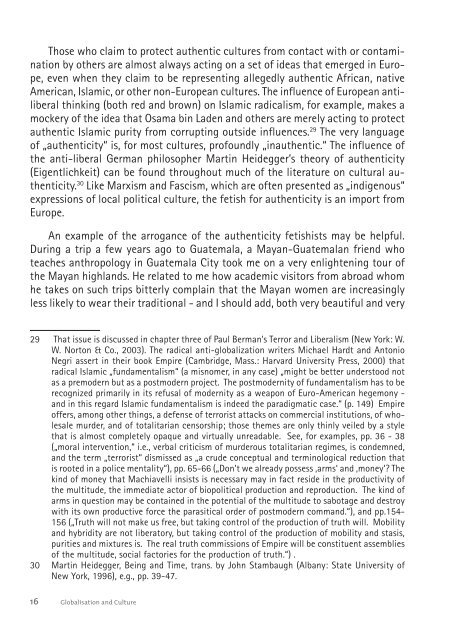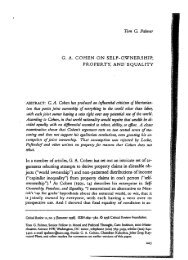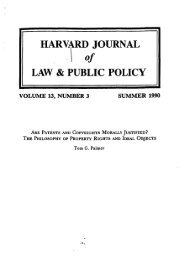Globalization and Culture - Tom G. Palmer
Globalization and Culture - Tom G. Palmer
Globalization and Culture - Tom G. Palmer
Create successful ePaper yourself
Turn your PDF publications into a flip-book with our unique Google optimized e-Paper software.
Those who claim to protect authentic cultures from contact with or contamination<br />
by others are almost always acting on a set of ideas that emerged in Europe,<br />
even when they claim to be representing allegedly authentic African, native<br />
American, Islamic, or other non-European cultures. The influence of European antiliberal<br />
thinking (both red <strong>and</strong> brown) on Islamic radicalism, for example, makes a<br />
mockery of the idea that Osama bin Laden <strong>and</strong> others are merely acting to protect<br />
authentic Islamic purity from corrupting outside influences. 29 The very language<br />
of „authenticity“ is, for most cultures, profoundly „inauthentic.“ The influence of<br />
the anti-liberal German philosopher Martin Heidegger’s theory of authenticity<br />
(Eigentlichkeit) can be found throughout much of the literature on cultural authenticity.<br />
30 Like Marxism <strong>and</strong> Fascism, which are often presented as „indigenous“<br />
expressions of local political culture, the fetish for authenticity is an import from<br />
Europe.<br />
An example of the arrogance of the authenticity fetishists may be helpful.<br />
During a trip a few years ago to Guatemala, a Mayan-Guatemalan friend who<br />
teaches anthropology in Guatemala City took me on a very enlightening tour of<br />
the Mayan highl<strong>and</strong>s. He related to me how academic visitors from abroad whom<br />
he takes on such trips bitterly complain that the Mayan women are increasingly<br />
less likely to wear their traditional - <strong>and</strong> I should add, both very beautiful <strong>and</strong> very<br />
29 That issue is discussed in chapter three of Paul Berman’s Terror <strong>and</strong> Liberalism (New York: W.<br />
W. Norton & Co., 2003). The radical anti-globalization writers Michael Hardt <strong>and</strong> Antonio<br />
Negri assert in their book Empire (Cambridge, Mass.: Harvard University Press, 2000) that<br />
radical Islamic „fundamentalism“ (a misnomer, in any case) „might be better understood not<br />
as a premodern but as a postmodern project. The postmodernity of fundamentalism has to be<br />
recognized primarily in its refusal of modernity as a weapon of Euro-American hegemony -<br />
<strong>and</strong> in this regard Islamic fundamentalism is indeed the paradigmatic case.“ (p. 149) Empire<br />
offers, among other things, a defense of terrorist attacks on commercial institutions, of wholesale<br />
murder, <strong>and</strong> of totalitarian censorship; those themes are only thinly veiled by a style<br />
that is almost completely opaque <strong>and</strong> virtually unreadable. See, for examples, pp. 36 - 38<br />
(„moral intervention,“ i.e., verbal criticism of murderous totalitarian regimes, is condemned,<br />
<strong>and</strong> the term „terrorist“ dismissed as „a crude conceptual <strong>and</strong> terminological reduction that<br />
is rooted in a police mentality“), pp. 65-66 („Don’t we already possess ‚arms‘ <strong>and</strong> ‚money‘? The<br />
kind of money that Machiavelli insists is necessary may in fact reside in the productivity of<br />
the multitude, the immediate actor of biopolitical production <strong>and</strong> reproduction. The kind of<br />
arms in question may be contained in the potential of the multitude to sabotage <strong>and</strong> destroy<br />
with its own productive force the parasitical order of postmodern comm<strong>and</strong>.“), <strong>and</strong> pp.154-<br />
156 („Truth will not make us free, but taking control of the production of truth will. Mobility<br />
<strong>and</strong> hybridity are not liberatory, but taking control of the production of mobility <strong>and</strong> stasis,<br />
purities <strong>and</strong> mixtures is. The real truth commissions of Empire will be constituent assemblies<br />
of the multitude, social factories for the production of truth.“) .<br />
30 Martin Heidegger, Being <strong>and</strong> Time, trans. by John Stambaugh (Albany: State University of<br />
New York, 1996), e.g., pp. 39-47.<br />
16 Globalisation <strong>and</strong> <strong>Culture</strong>











